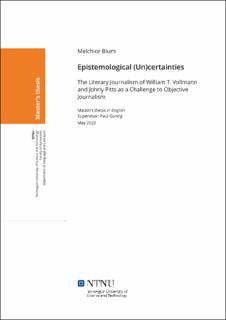Epistemological (Un)certainties: The Literary Journalism of William T. Vollmann and Johny Pitts as a Challenge to Objective Journalism
Abstract
Sjangeren litterær journalistikk kombinerer litteraturens oppfinnsomme måter å skape en fortelling på med journalismens fokus på å beskrive virkeligheten nøyaktig. Denne todelte orienteringen utfordrer normene for objektiv journalistikk, en sjanger som i økende grad har blitt kritisert. Gjennom analyse av William T. Vollmanns Riding Toward Everywhere (2008) og Johny Pitts Afropean (2019), utforsker denne oppgaven et utvalg av teknikker litterære journalister anvender i praksis og hvordan de tilbyr alternative måter å forestille seg virkeligheten på. Begge forfatterne viser økt selvbevissthet, noe som gir mulighet for en mer transparent oppbygging av verden gjennom språk. Deres åpenlyse engasjement i teksten kan ses på ulike nivåer, for eksempel når de bruker verkene sine til selvbiografisk selvrealisering og setter forfatterskapet sitt innenfor en bredere kulturell bane. I tillegg reflekterer begge forfatterne over deres fordypning i miljøet, og peker på de epistemologiske mulighetene og begrensningene i verkene deres. Publikasjonene har likevel, deres fellestrekk til tross, ulike fokus: der Vollmanns verk er full av epistemologisk tvil som stiller spørsmål ved vår fornuftsmessige forståelse av både litteratur og journalistikk, fremmer Pitts en mer aktivistisk agenda og øker bevisstheten om afrikansk europeiske samfunn. The genre of literary journalism combines literature’s imaginative ways of creating narratives with journalism’s focus on accurately describing reality. This twofold orientation challenges the norms of objective journalism, a genre of writing that has come under increasing critical scrutiny. By analyzing William T. Vollmann’s Riding Toward Everywhere (2008) and Johny Pitts’ Afropean (2019), this thesis explores a selection of the techniques literary journalists employ in practice and how they offer alternative ways of imagining reality. Both authors display an increased self-reflectivity, which allows for a more transparent construction of the world through language. Their overt involvement in the text can be seen on different levels as they use their works for autobiographical self-realization and situate their writing within a wider cultural trajectory. Similarly, both authors reflect on their immersion within the environment and point to the epistemological possibilities and limitations of their writing. Yet despite the commonalities, the two publications have a different focus: while Vollmann’s work is riddled with epistemological doubts that question common-sensical understandings of both literature and journalism, Pitts has a more activist agenda and raises awareness about African European communities.
